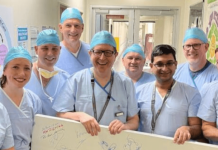Bath-based Somnus Scientific is an anaesthetics innovator that makes anaesthesia safer for patients, better for the environment, and more cost-effective for healthcare by unlocking alternatives to traditional gas-based anaesthetics. In a recent development, the company has secured £600K in funding.
Growth plans
The investment round was led by a combination of private investors and a cornerstone institutional investor, Utilico Emerging Markets Trust plc. The company intends to use the funds to further develop its products before undertaking testing in the UK. It plans for a phased domestic and international launch with the primary focus being on Europe and the global markets will follow suit.
To fund its research and development, Somnus began work with Innovate UK EDGE Access to Finance Specialist, Ed Tellwright.
Tim Craft, Co-Founder and Chief Executive Officer, Somnus Scientific.said, “Ed really helped hone our pitching skills – we now focus on getting our ‘home runs in early’ grabbing the investor’s attention early on with our key selling points. The whole package of support from Innovate UK EDGE has opened doors that would have been very difficult to open by ourselves,” says Tim, “and it’s really helping us to accelerate towards commercialisation.”
Alternative anaesthetics solution
Founded by Tim Craft, Mark O’Connell, and Denis Lonergan in 2019, Somnus Scientific’s solution is to aid the transition to the use of propofol as a drug for maintaining anaesthesia. Propofol is a short-acting sedative that supports a rapid, high-quality recovery with very low incidences of nausea and patient confusion.
Despite being first licensed for use in 1986, propofol has to date been primarily used as a drug for initiating anaesthesia, rather than a replacement for gases for its continuance. This has been largely due to the inability to accurately measure the levels of propofol concentration in a patient’s bloodstream in real-time, and therefore monitor the extent and depth of the patient’s sedation during a procedure.
Somnus’ world-first biosensor solves this problem. It uses enzymes to metabolise propofol, producing electrons that are measured at the sensor, enabling anaesthetists to monitor and adapt sedation levels in real-time. Also, the company is producing an adapted sensor to be used in intensive care units, where propofol is frequently used to sedate patients who, for example, are being mechanically ventilated.
“Retrospective analysis indicates that patients who have cancer and are anaesthetised with propofol are more likely to be alive five years later than those given gaseous anaesthesia,” said Tim.
Tim is now beginning work with Innovate UK EDGE Medical Sector Specialist, Patrick Finnemore, to identify potential partners and collaborators, and review the strategic direction of the company. Furthermore, Innovate UK EDGE will continue to support Somnus Scientific as the business takes major steps towards safer, greener, more cost-effective anaesthesia and sedation for patients across the planet.
Optimises intensive care resources
Faster patient discharge translates to optimised intensive care resources as well. By improving discharge rates with its anaesthestics solution, Somnus’ innovation will help optimise the use of these limited resources.
“The practice of keeping anaesthetised patients unconscious with gasses really hasn’t changed much in over 100 years, and 90% of operations worldwide are still performed using this technology,” said Tim Craft. Anaesthetic gasses are heavily linked with nausea, slow recovery, memory loss and environmental damage, accounting for 5% of a typical hospital’s carbon footprint. There’s now lots of research evidence indicating that a significant majority of patients in intensive care are over sedated, meaning they stay longer in the intensive care unit, they take longer to get off a ventilator, and most significantly, they are less likely to survive.”
Are You Hiring?




